| |
Lee Gordon Bio and Resume
My life as a professional Voiceover Artist has its roots on a spring day in 1967 when, as a senior at Mount Hermon School, I was approached by a fellow student taking a survey to determine if there was sufficient interest to launch a campus radio station. I said "Sign me up," and soon thereafter, on the day WMHS (now known as WNMH)was launched, so was my announcing career.
After graduation from 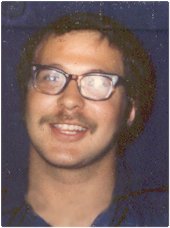 Mount Hermon I enrolled at Rutgers University where one of my first priorities was to join the air staff of the student radio station WRSU. In fact, I devoted so much time to the station and other extracurricular activities that I had little time left for studies and I flunked out after my freshman year. Mount Hermon I enrolled at Rutgers University where one of my first priorities was to join the air staff of the student radio station WRSU. In fact, I devoted so much time to the station and other extracurricular activities that I had little time left for studies and I flunked out after my freshman year.
Following a year in junior college (where they had no student radio station) I returned to my native state and enrolled at the University of New Hampshire. Naturally, I sought out and signed on with the campus station WUNH. Late in that initial year at UNH I made my professional broadcasting debut with my first paying gig: a two-dollar-an-hour job as a part-time (rip and read) newsman and weekend announcer at WHEB in nearby Portsmouth, NH.
The next year (what should have been my final year at UNH) 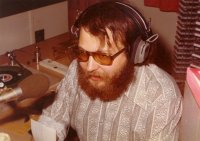 I took on a second weekend radio job as a disk jockey at WFEA in my hometown of Manchester, NH. I took on a second weekend radio job as a disk jockey at WFEA in my hometown of Manchester, NH. I also moved from WHEB to crosstown rival WBBX where, because the station had a directional antenna and I held a First Class Radiotelephone Operators License, I was able to boost my pay to four dollars an hour (three dollars when the station was transmitting on the non-directional day pattern).
Several of my fellow WUNH staffers also had part-time jobs at local commercial stations. In addition, we were working on a project to increase the student station's power from 10 watts to 1750 watts. We literally built a radio station that year. As a result, most of us took an extra semester to finish our formal undergraduate educations. Thus, a small band of my fellow members of the Class of 1971 and I finally received our degrees in February of 1972. Fortunately, I was able to parlay some of WUNH time as well as my "real world" experience into enough credits to add a second major and I left the campus with a Bachelor of Arts degree in both Political Science and Mass Communication.
As it happens, the Program Director who had hired me at WFEA was also the Afternoon Drive DJ and he had just accepted a job in a bigger market. That week I got a call from the General Manager offering me the afternoon shift so, the day after my college graduation, I began my full-time broadcasting career. I did afternoons at WFEA for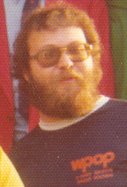 the next two years until I decided it was time to take the next step. the next two years until I decided it was time to take the next step.
I applied for, and got, a job at one of the country's legendary Top-40 stations, WPOP in Hartford, Connecticut. Expecting to take on the 10 PM to 2 AM shift, I was pleasantly surprised when I was assigned the 10 AM to 2 PM time slot instead. Starting in early February, 1974, and for the rest of that year I held down the Midday shift. Then, at the end of 1974 I was moved to Afternoon Drive where I stayed until the end of June, 1975 when WPOP suddenly pulled the plug on rock 'n roll and changed format to All News. Having been the unofficial "Assistant Production Director" under Lance Drake, I pitched management to name me Production Director, since that job had become available at the same time as the format change. Thinking I would be out the door the minute the first DJ gig became available, they declined.
During 1974 and 1975 I began supplementing my radio income with a few freelance voiceover jobs for local advertising agencies. Shortly after the WPOP format change I went to work for one of those agencies, Brentco Corporation, as a Copywriter. Eventually I was named Creative Director. While working at Brentco I was able to stay connected to the radio business when, in 1977, I was hired to do a weekend Disc Jockey shift at WRCQ (Golden 91-Q) the station which came to fill the vacuum left by WPOP's departure from the local music radio scene. In late December of 1978 the management at WPOP realized I wasn't an itinerant disc jockey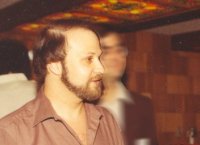 after all and offered me the job I had sought 3 1/2 years earlier. I resigned from both Brentco and WRCQ and returned to WPOP as Production Director. Ultimately, that job came to encompass WPOP's sister station at 104.1 FM. During my tenure it was first known as WIOF (Magic 104), later as WYSR (Star 104.1), and finally WMRQ (Radio 104). I remained as Production Director until January of 1997 when, after the cluster of stations had grown to five with the additions of WHCN, WKSS and WWYZ, my position was consolidated out of existance. Having seen the handwriting on the wall, I had already decided not to seek regular employment elsewhere but, instead, devote my after all and offered me the job I had sought 3 1/2 years earlier. I resigned from both Brentco and WRCQ and returned to WPOP as Production Director. Ultimately, that job came to encompass WPOP's sister station at 104.1 FM. During my tenure it was first known as WIOF (Magic 104), later as WYSR (Star 104.1), and finally WMRQ (Radio 104). I remained as Production Director until January of 1997 when, after the cluster of stations had grown to five with the additions of WHCN, WKSS and WWYZ, my position was consolidated out of existance. Having seen the handwriting on the wall, I had already decided not to seek regular employment elsewhere but, instead, devote my 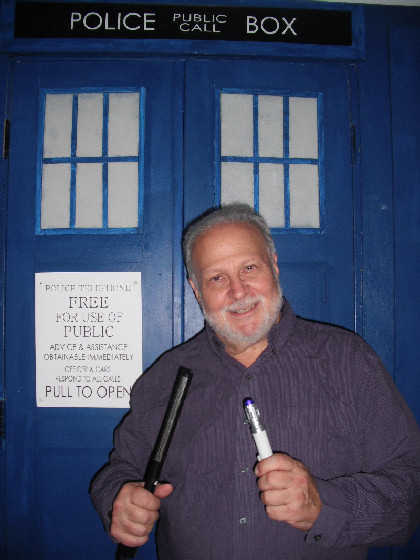 energy to becoming a full-time Voiceover Artist. And, yes, my recording booth is a TARDIS, and although it is not actually bigger on the inside, it is equipped with ISDN so it can, in effect, bring you my voice in broadcast quality, anywhere in time and space. energy to becoming a full-time Voiceover Artist. And, yes, my recording booth is a TARDIS, and although it is not actually bigger on the inside, it is equipped with ISDN so it can, in effect, bring you my voice in broadcast quality, anywhere in time and space.
During my second stint at WPOP I was approached by Hartford television station WFSB to become a Booth Announcer on a part-time basis. I began those duties in October of 1986 and continue to hold that position. Shortly after my departure from WPOP in 1997, I was also approached by the Connecticut Lottery to become an on-air TV host of drawings for their newly created Mid-Day 3 and Mid-Day 4 games (seen on WTIC-TV Fox 61). I officially retired from the Lottery in 2011.
More recently, I became the self-appointed Voice President of the United States.
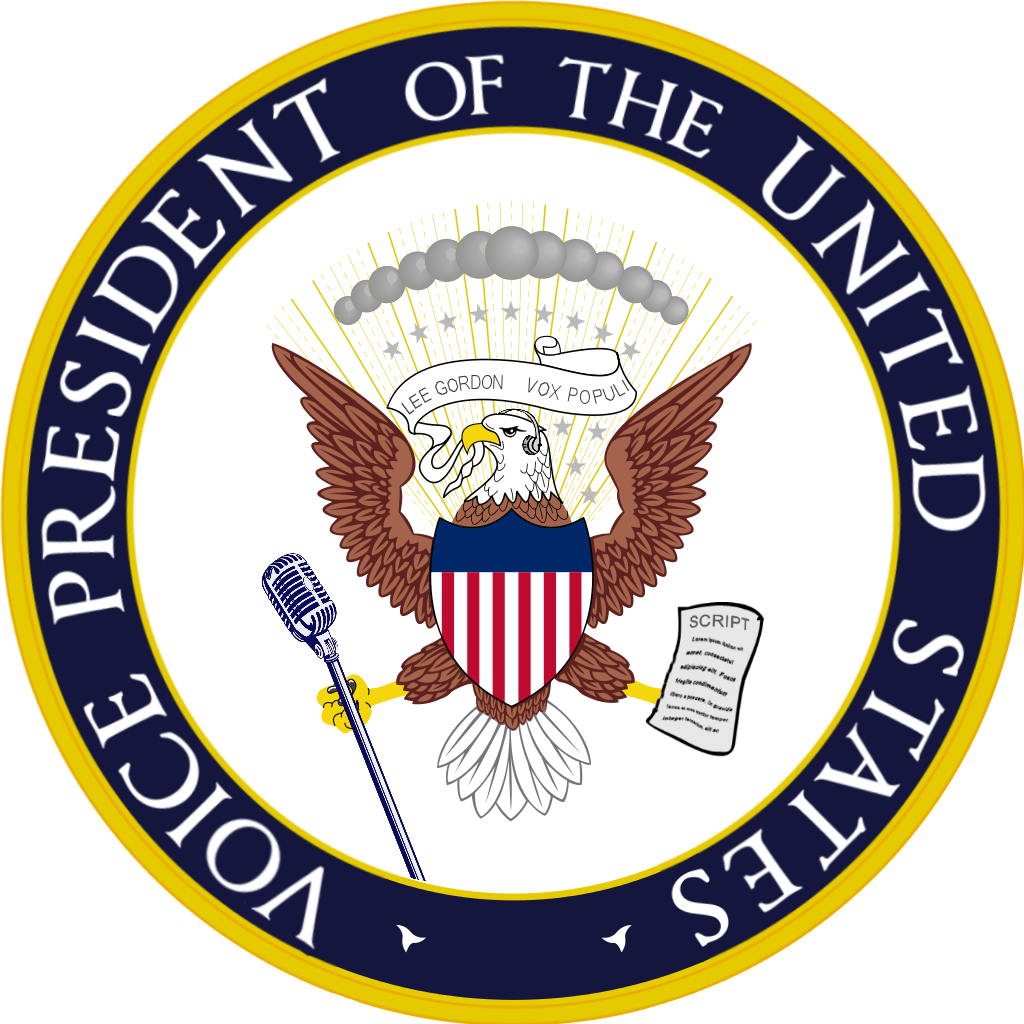
In addition to the thousands of commercials I have written throughout the years, in 2005 I added magazine writing to my repertoire, contributing several articles, from tool reviews to humor pieces and even a poem, to Woodcraft Magazine. Then, in 2006, I expanded my writing credentials as a contributing editor for this book, published by Harper Collins and the Smithsonian: Collins Complete Woodworker
|
 |